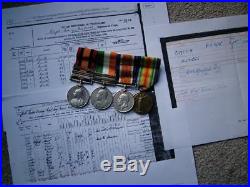
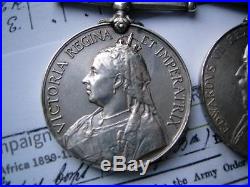
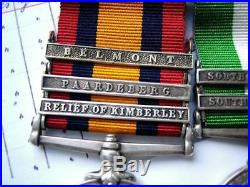
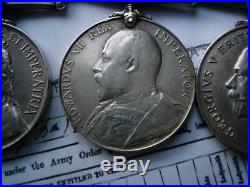
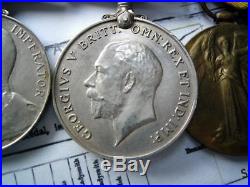
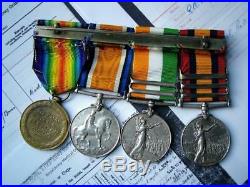
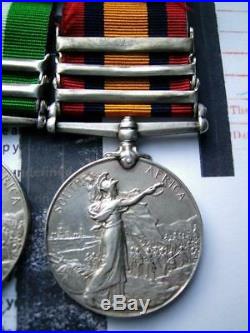
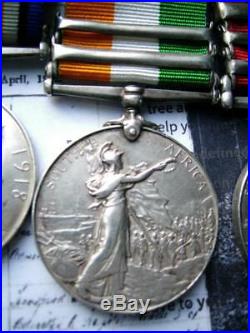
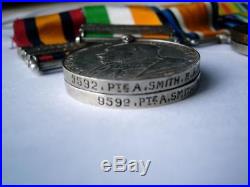
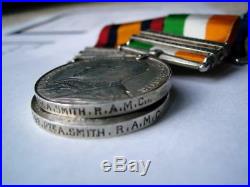
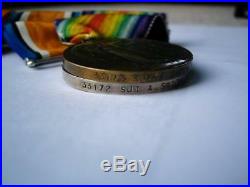
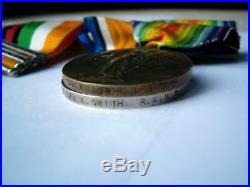
Boer War QSA & KSA & WW1 group of medals, QSA with 3 important battle bars, Belmont, Paardeberg and Relief of Kimberley, awarded to PRIVATE A SMITH RAMC, name contemporary engraved capitals, nearly extremely fine, WW1 medals, Victory and British war pair to Sergeant A Smith RAMC, Impressed official naming, comes with medal roll copy, see pictures for condition. Boer war & WW1 medals KSA QSA Belmont Paardeberg Relief Kimberley Sgt Smith RAMC. QSA & KSA Battle of Paardeberg, Belmont, Relief of Kimberley + WW1 Pair Private/Sergeant A Smith Royal Army Medical Corps Boer War QSA & KSA & WW1 group of medals, QSA with 3 important battle bars, Belmont, Paardeberg and Relief of Kimberley, awarded to PRIVATE A SMITH RAMC, name contemporary engraved capitals, nearly extremely fine, WW1 medals, Victory and British war pair to Sergeant A Smith RAMC, Impressed official naming, comes with medal roll copy, see pictures for condition. Battle of Belmont (1899). The Battle of Belmont is the name of an engagement of the Second Boer War on 23 November 1899, where the British under Lord Methuen assaulted a Boer position on Belmont kopje. Methuen’s three brigades were on their way to raise the Boer siege of Kimberley. A Boer force of about 2,000 men had entrenched on the range of Belmont kopje to delay their advance. Methuen sent the Guards Brigade on a night march to outflank the Boers, but due to faulty maps the Grenadier Guards found themselves in front of the Boer position instead. The Guards, the 9th Brigade and the Naval Brigade assaulted the Boers over open ground, suffering about 200 casualties. Before the British came to use their bayonets, the Boers retreated by pony and re-formed in another entrenched position at Graspan, where the pattern was repeated with the British suffering another 197 casualties: one sailor reporting that “at 200 yards we fixed bayonets, and we just saw their heels; they didn’t wait when they heard the rattle”. The Battle of Paardeberg or Perdeberg (“Horse Mountain”) was a major battle during the Second Anglo-Boer War. It was fought near Paardeberg Drift on the banks of the Modder River in the Orange Free State near Kimberley. Surrender of Boer General Cronje. Lord Methuen advanced up the railway line in November 1899 with the objective of relieving the besieged city of Kimberley (and the town of Mafeking, also under siege). Battles were fought on this front at Graspan, Belmont, Modder River before the advance was halted for two months after the British defeat at the Battle of Magersfontein. In February 1900, Field Marshal Lord Roberts assumed personal command of a significantly reinforced British offensive. The army of Boer General Piet Cronjé was retreating from its entrenched position at Magersfontein towards Bloemfontein after its lines of communication were cut by Major General John French, whose cavalry had recently outflanked the Boer position to relieve Kimberley. Cronjé’s slow-moving column was intercepted by French at Paardeberg, where the Boer general eventually surrendered after a prolonged siege, having fought off an attempted direct assault by Lieutenant General Horatio Kitchener. Major-General Sir John French. While Methuen’s 1st Division demonstrated against the Boer entrenchments at Magersfontein and the Highland Brigade under Major General Hector MacDonald marched 20 miles (32 km) westward to Koedoesberg and fixed the Boers’ attention to their right flank, Roberts’s large force began marching east in secret, late on 11 February. By the evening of 12 February, his leading horsemen had secured fords across the first obstacle, the Riet River. The next day, 13 February, the British mounted force made a gruelling march of 30 miles (48 km) under a blazing sun to capture fords across the Modder. The effect of the heat was made worse when the dry grass of the veld caught fire from a carelessly discarded match. French’s division had to wait at the fords (at Klip Drift) during the next day until the leading infantry reached them, after making an equally exhausting march. Luckily for the British, the move had taken the Boers by surprise and they did not move in strength to defend the fords or the hills nearby. Early on 15 February, French’s division began the final march to relieve Kimberley. Only scattered and disorganised Boers opposed them, and the enormous mass of British horsemen broke through their thin line, concealed in the dust cloud they created. Late that evening they reached Kimberley, where they were greeted with cheering crowds. French should by rights have gone to the military commander of the besieged garrison, Lieutenant Colonel Kekewich. Instead he called first on Cecil Rhodes, the former Prime Minister of Cape Colony and foremost Imperialist, at the town’s chief hotel. The final day’s ride had crippled most of French’s division. Most of his British regular cavalry carried too much equipment and their unacclimatised horses (and those of the seven batteries of horse artillery) were exhausted. His effective force was reduced to two regiments of New Zealand and Australian light horse, and two “brigades” (actually battalions) of mounted infantry. French was to further tire his men on 16 February by futile attempts to intercept one of the Boers’ Creusot 40-pounder siege guns (nicknamed “Long Tom”) which was withdrawing to the north. Create your brand with Auctiva’s. Attention Sellers – Get Templates Image Hosting, Scheduling at Auctiva. Track Page Views With. Auctiva’s FREE Counter. The item “Boer war & WW1 medals KSA QSA Belmont Paardeberg Relief Kimberley Sgt Smith RAMC” is in sale since Thursday, January 10, 2019. This item is in the category “Collectables\Militaria\Boer War (1899-1902)”. The seller is “theonlineauctionsale” and is located in England. This item can be shipped worldwide.
- Era: 1816-1913
- Service: Army
- Type: Medals & Ribbons
- Issued/ Not-Issued: Issued
- Conflict: Boer War (1899-1902) / WW1
- Country/Region of Manufacture: United Kingdom
- Country/ Organization: Great Britain